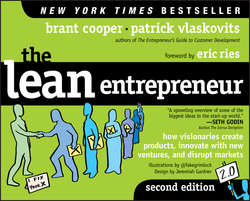Читать книгу The Lean Entrepreneur - Vlaskovits Patrick - Страница 10
На сайте Литреса книга снята с продажи.
1
STARTUP REVOLUTION
ОглавлениеWelcome to the Age of Value Creation. If your organization is not creating value for customers, you are done. If you are focused on wealth creation, if your objective is to profit off fomenting fear or instilling insecurities, or if your business model depends on spoon-feeding solutions, you are done.
In the value creation economy, the customer has the power. The technological transformation we are witnessing provides both consumers and business buyers with vast amounts of knowledge about markets, products, features, capabilities, and reputation; myriad products and companies to choose from; and the power to more easily switch from one company to another. Knowledge at our fingertips comes from the Internet and computers in our pockets; it is easier than ever for customers to curate, analyze, and share opinions and information. Product and company choice comes from globalization, the rise of entrepreneurs and freelancers, and market-expanding enterprises.
All this change has created new rules in the economy: The customer has the power, so you must be focused on creating value for and maximizing the experience of the customer.
Further, we are arguably at the beginning of these trends. The breakthrough technologies of artificial intelligence, robotics, digital fabrication, and open-source hardware will continue to push power to the customer. Customers will increasingly be able to design custom-fit solutions for their individual pains and passions.
These changes don’t come without costs. These changes disrupt the existing economy, collapsing relatively young enterprises like Blockbuster and Borders, decades-old household names like Kodak, and even century-old stalwarts like Nokia, putting tens of thousands of people out of work.
Disruption hurts.
Even in the best of times it’s the worst of times: The very structure of the global economy is changing, forever. Millions are unemployed and suffering worldwide. Manufacturing is not merely being sent offshore; it’s being permanently displaced, even in China. Service jobs are the capitalists’ new “unit of labor.” White-collar jobs are being sent offshore. Online marketplaces are turning college-education skills into commodities. At the online workplace Upwork, customers can get competing bids from onshore and offshore contract freelancers or businesses: engineering, accounting, marketing, sales, website development, design, customer service, technical support, administrative assistance, writing, editing, translating, human resources (HR), legal, recruiting, statistical analysis, and information technology (IT).
One of Henry Ford’s great insights was that if he could produce a car at a price his workers could afford, he’d have a huge market.
As entrepreneur and author Seth Godin writes, “The factory – that system where organized labor meets patient capital, productivity-improving devices, and leverage – has fallen apart. Ohio and Michigan have lost their ‘real’ factories, just as the factories of the service industries have crumbled as well. Worse still, the types of low-risk, high-stability jobs that three-quarters of us crave have turned into dead-end traps of dissatisfaction and unfair risk.”3
What will people do for a living?
What’s going on? It’s pretty hard to wrap your head around. Economic growth indicators that describe the past to help us plan for the future will be revised backward soon. (Don’t worry; experts will be on hand to explain.)
It’s not just the economy, either; it’s how we talk about it. Political institutions have never seemed so clueless, having the same arguments they had in the 1950s. The media is equally flummoxed, having given up trying to separate political fact from fiction, science from opinion. Pundits are proven wrong on a daily basis, only to be trotted out before the masses for their opinions again. Economists run models based on assumptions that have no real-world bearing.
There’s a lot of doom-and-gloom prophecy reminiscent of the eighteenth-century cleric Thomas Malthus, who wrote that “the power of population is so superior to the power in the earth to produce subsistence for man, that premature death must in some shape or other visit the human race.”4
Yet, tech hubs of entrepreneurial activity are thriving not only in Silicon Valley, Manhattan, Santa Monica, and Boston, but in Boulder, Grand Rapids, and San Diego.
We find ourselves amid a tremendous storm of economic, technological, and cultural transformation. We are experiencing massive waves of change, high tides of anxiety, and a tumultuous backwash of resistance. This disruption has created an odd mixture of extraordinary market efficiency and entrepreneurial innovation, coupled with volatility and uncertainty at unprecedented levels.
How do you face uncertainty?
To survive and indeed to prosper through these changes, whether as an individual, a startup, or a large enterprise, you must be fast, efficient, and value-creating. You must be close to your customer, be optimized for learning, and use data to help inform decisions. You have to be lean.
3
Seth Godin, Linchpin: Are You Indispensable? Kindle ed. (New York: Penguin Group, 2010), 8.
4
Thomas Malthus, An Essay on the Principle of Population, 1st ed., unrevised (1798).
